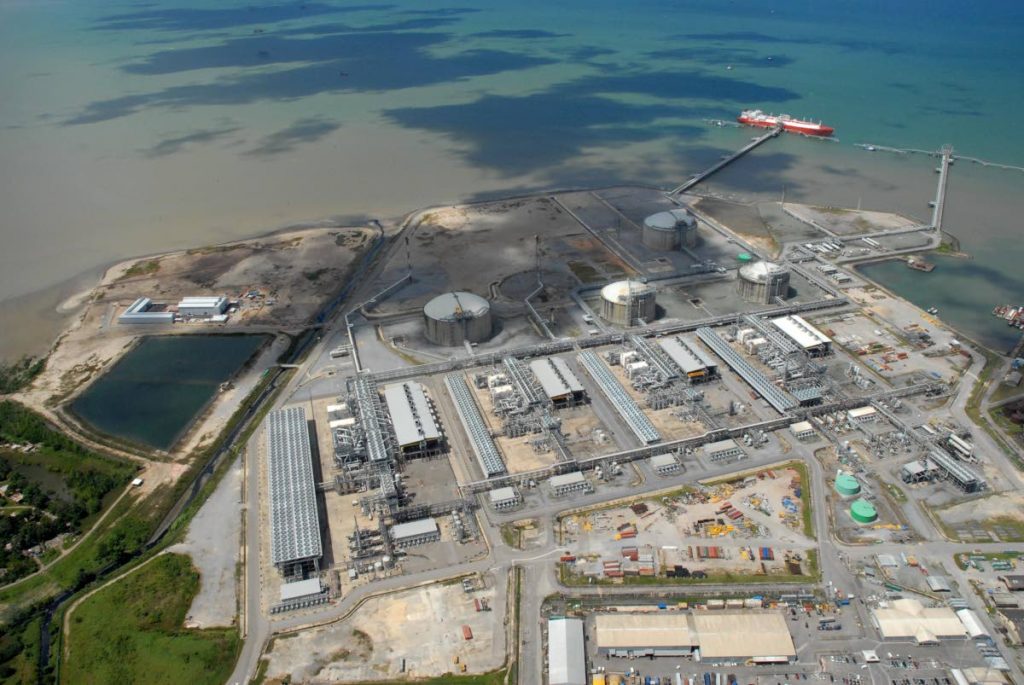
(Trinidad Express, 10.Aug.2021) — In its 2021 annual report, the T&T Government’s investment holdings company, National Enterprises Ltd (NEL) states that “the full impairment of the Train 1 plant at Atlantic LNG” resulted in the fair value of NEL’s shareholding in Train 1 being written down from the value of $192.5 million in its 2020 financial year 2020 to $43.9 million in its 2021 financial year.
NGC owns ten per cent of Train 1 and 11.1 per cent of Train 4. NEL has a 37.84 per cent interest in NGC Trinidad and Tobago LNG Ltd (NGC LNG), which holds NGC’s ten per cent shareholding in Train 1. Therefore, it seems to me, NEL indirectly owns 3.784 per cent of Train 1.
NEL wrote down the value of its indirect 3.784 per cent shareholding in Atlantic Train 1 by 77.2 per cent because for much of its 2021 fiscal year—which was from April 1, 2020 to March 31, 2021—Train 1 was not operational, meaning it was not producing LNG.
My back-of-the-envelope calculation indicates that NEL’s write down of its 3.784 per cent indirect stake in Train 1 to $43.9 million from $192.5 million suggests a valuation of 100 per cent of Train 1 as at March 31, 2021 of $1.159 billion. That’s down from $5.087 billion as at March 31, 2020.
But an accountant warned me to be careful about extrapolating from NEL’s valuation without knowing its methodology/basis.
“The valuation is specific to NEL’s investment as an investment holding company. If the valuation was being done for another purpose (sale, financing, expansion etc) it may have a different result,” said the accountant.
Given the trust placed in the accountant, I have no reason to disbelieve that valuing an investment of shares in an investment holding company would produce different results than if those shares were being valued for sale, financing or expansion.
But I would imagine that the four other shareholders of Train 1—Shell (46 per cent), BP (34 per cent), China Investment Corporation (ten per cent) and the 6.2 per cent that NGC owns as NGC—also hold their shares in Train 1 in investment holding companies.
And, it is certain each of the other Train 1 shareholders would have conducted valuation exercises of their own on their shareholding in Train 1.
Based on the last such exercise BP did, it is almost certain that the energy giant has completely written off the value of its 34 per cent stake in Train 1. This follows the London-headquartered company’s decision that it was not “contractually obligated” to supply 100 per cent of the natural gas to Point Fortin’s first LNG facility.
If I am right, and BP has written off its shareholding in Train 1, the question is would it accept a token payment of US$1 from NGC for its 34 per cent stake in the facility?
And if Shell has written off its 46 per cent investment in Train 1, would it also be amenable to selling its stake in the facility to NGC for the token sum of US$1?
BP has made many billions of US dollars from Train 1 over the life of the 20-year contract to supply gas from May 1998 when it was commissioned and .
Why would NGC want to buy Train 1?
It seems to me that NGC is, among other things, an aggregator of the natural gas it purchases from the major upstream suppliers—BP, Shell, BHP and EOG Resources in that order.
As aggregator, NGC allocates natural gas in accordance with the contractual obligations it has with the downstream users of the commodity.
Although the natural gas production in 2020 of 3.044 billion standard cubic feet/per day (bcf/d) was 15.16 per cent lower than the 3.59 (bcf/d) that was produced in 2019, there is every indication that 2022 is going to be a brighter year for natural gas production:
• DeNovo Energy, which is majority owned by Proman, announced last week that it had signed a gas sales contract with NGC that will result in 40 million cubic feet of gas per day next year;
• On July 22, Shell announced that production had started from its Barracuda field with peak production expected to be 220 million cubic feet/day of natural gas;
• Touchstone Energy in July spoke about its Cascadura gas discoveries as having the potential for 200 million scf/d;
• BP says 600 million scf/d will come from its Matapal and Cassia compression projects off the southeast coast of Trinidad starting in 2022, according to an Argus story on June 9.
If after careful study, with independent verification, NGC determines that its supply of gas in 2022 would be in excess of the demand for the commodity, it should consider making a bid for the shares of the two main Train 1 shareholders—Shell and BP.
Questions to answer
My raising the possibility of NGC acquiring additional shares in Train 1 is neither blind nor stupid. As T&T’s most valuable State asset, NGC has a responsibility to conduct thorough due diligence on all acquisitions, whether the expenditure is US$1 or US$100 million. And given the importance of natural gas to the T&T economy, NGC must always focus on protecting and promoting the national interest.
Above all, NGC must ignore those who argue that climate change is the death knell of the natural gas industry and who question NGC’s corporate obligation to take “risky” decisions that are properly supported by analysis and data.
NGC, however, has some serious questions to answer before it can consider making a bid to acquire 34 or 80 per cent of Train 1 from BP and/or Shell.
The 2021 NEL’s annual report states: “The contract for the supply of natural gas to Atlantic Train 1 expired in May 2018 and to date no long-term agreement has been secured.”
• Why did NGC allow the expiration of BP’s 20-year contract to supply natural gas to Train 1 without having a new agreement in place?
• When did BP officially notify the Government and NGC that it did not have the gas to supply Train 1?
• Did NGC commit to be the sole source of the $200 million plus turnaround of Train 1 before or after BP’s announcement of problems with its infill drilling programme in May 2019?
• Do the Government and NGC have the ability to independently verify statements made by upstream producers of gas?
____________________

